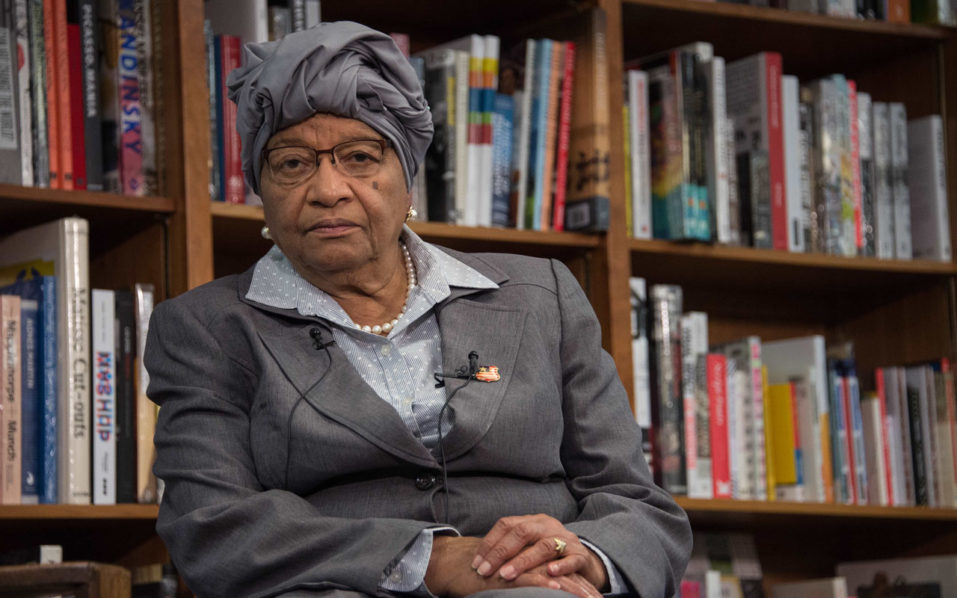
Liberia’s female politicians profess near-universal respect for Ellen Johnson Sirleaf as she steps down after 12 years as president — but many also say the glass ceiling that Africa’s first female leader cracked remains firmly in place.
Sirleaf, 78, will not run in October 10’s presidential election after a constitutionally mandated two terms.
In 2005, she unexpectedly swept the country’s first vote after a brutal civil war, and during her time in office the fragile peace has held.
But “Ma Ellen”, as she is known at home, is the first to admit her tenure has failed to deliver meaningful representation for women in Liberian political life.
“We haven’t worked hard enough for parity,” she said in a recent CNN interview.
“It saddens me, because I represented breaking the glass ceiling in Africa.”
Just a tenth of Liberia’s 30 senators and only a sixth of candidates standing in next Tuesday’s elections, which are for the presidency, vice presidency and House of Representatives, are women. Those figures have barely budged since 2005.
Meanwhile levels of teenage pregnancy and sexual violence against girls remain extremely high and less than half of women can read or write.
“Irrespective of how many women win or lose, women have got to stay in the race and women have got to stay on the political landscape,” said MacDella Cooper, a former model turned humanitarian.
She is the sole female presidential candidate, running against 19 men.
Cooper, like several female candidates contacted by AFP, admires Sirleaf’s grit but says the nation needs a different kind of leader who can broaden prosperity as well as keep peace.
“Fifteen percent of our country’s citizens are living so well but the rest are left to fight for themselves,” she said.
‘Anti-feminist’?
Two Liberian feminists have caused a stir by asserting in international media that Sirleaf has “failed” women in the political realm, potentially tarring her legacy.
“I think President Sirleaf is anti-feminist when it comes to politics,” Robtel Neajai Pailey, who co-authored a widely shared article with activist Korto Reeves Williams, told AFP.
She accuses Sirleaf of indifference to a call by Liberia’s Women’s Legislative Caucus for women to occupy 30 percent of political party leadership positions in 2010.
Pailey believes women fall behind in gaining affiliation with larger political parties and often lack their own funding, unlike some of this year’s millionaire male candidates.
Her colleague Williams says the difficulties of building a public profile for women start early, especially in a society where rape was systematically used as a weapon of war.
“The woman who decides that she wants to run for public office at 30 may have been the girl who was a dropout from elementary school because she got raped and had a child,” she says.
Until Liberian politics provides “access to economic resources all the way until the point that this woman wants to be a senator or representative”, women will remain excluded unless they have wealth or connections, Williams believes.
Others point to a gender violence court that only operates in the capital, Monrovia, depriving rural women of justice for sex crimes, as an example of a missed opportunity by Sirleaf to go further.
‘What more do women want?’
Few would place the blame for women’s low levels of participation in politics solely at Sirleaf’s door, however.
The UN’s agency for women warns that “deeply held traditional beliefs about women’s role as home makers make it particularly difficult for women candidates,” as it urges women to run.
Jewel Howard-Taylor, a senator and ex-wife of former warlord-turned-president Charles Taylor, believes her candidacy for the vice-presidency is viewed dimly after 12 years of another woman at the top.
“There’s a perception that because we have a female president in Liberia that everything has been handled,” she told AFP in between campaigning for votes with presidential candidate and former football superstar George Weah.
“What more do the women want?” was a common refrain, she said.
“Politics is a game. There are rules, there are regulations, there are dos and don’ts, but we don’t learn it when we are growing up; so you get thrown into the national legislature but the men seem better because they learn all of this when they are growing up,” she said.
In fact, Howard-Taylor contends her gender may be more of a talking point than her role as a former first lady to Taylor, who was president from 1997 to 2003 after leading a rebellion in 1989 that sparked one of Africa’s most brutal civil wars.
Taylor is serving 50 years in a British jail for war crimes over his role in fuelling neighbouring Sierra Leone’s own long civil conflict.



